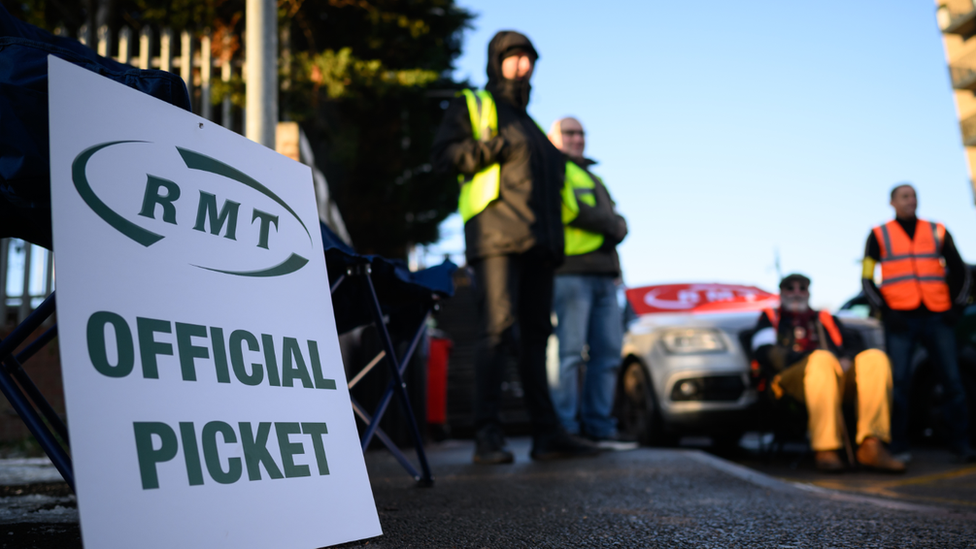Anti-strike law sets up battle over principles
- Published

Railway workers would be obliged to maintain a specified minimum service level under the new laws
The government wants to lessen the impact of strikes in half a dozen public services.
But what difference will its planned new law make, and by when?
Ministers picked their moment to set out their plans: on a day when train drivers had walked out, and within hours of the Labour leader's new year speech, poaching some of Keir Starmer's limelight.
The planned new law will see the light of day early next week, I'm told, when it is given what's called its first reading, external in the Commons.
It is then expected that it will have its second reading - when MPs get a chance to debate it - the week after next.
Ministers don't anticipate their plans encountering any significant problems in the Commons, where the government has a sizeable majority, but that is far from the end of it.
That's because its next stop will be the House of Lords, where the numbers are much less favourable for the government.
And then there is the possibility of legal challenges too. The trades unions are incensed by the plans.
So, in short, these ideas, even if they do become law, won't make any difference as far as this winter's strikes are concerned - and they might not make any difference for rather a while.
In the short term at least, they represent a battle over principles rather than a battle over consequences.
And it is a battle where the Conservatives and Labour have very different instincts.
Keir Starmer told me if Labour wins the next election he would get rid of this new law. Ministers, though, hope their argument will be seen as pragmatic.
They have decided against outright bans on strikes in any new sector. One senior figure said such a move would have been "very draconian".
Watch: Starmer: We will repeal Tory anti-strike legislation
Instead, they want minimum service levels in crucial public services - you can read more of the detail here.
Crucially, what we don't know yet is precisely what those minimum service levels might be.
How many trains would run on a day when rail workers were on strike? What category of emergency would justify an ambulance being sent to you, when ambulance workers are on strike?
These details will be worked through in consultations, due to start imminently.
Meanwhile, minsters in relevant departments are inviting union leaders in to see them, about the next financial year's pay settlements.
Again, they hope to be seen to be pragmatic, but union leaders say there is nothing pragmatic about saying your door is open but having nothing to offer on the table once you're sat around it.
But the view in government is they have no option but to be tough on the strikes, because there isn't any money left.
The argument goes that ministers can't borrow the money, for fear of spooking the markets as former prime minister Liz Truss did, there is no appetite to put up taxes, they think, and there's no spare money in existing budgets.
Yes, it is projected the rate of inflation could fall considerably before too long.
But we should still expect, given everything you have just read, that relations between the government and trades unions will, probably, show little sign of vast improvement any time soon.
Related topics
- Published31 January 2023

- Published1 August 2023

